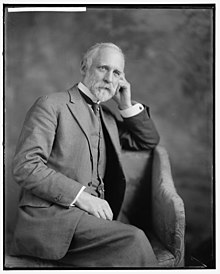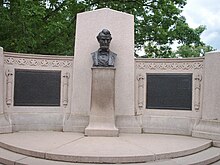Henry Kirke Bush-Brown (April 21, 1857 in Ogdensburg, New York[2] –1935) was an American sculptor and the adopted nephew of sculptor Henry Kirke Brown. He was raised in Newburgh, New York and attended the National Academy of Design in New York City. He became known for historically accurate realist sculptures illustrating American history.
Henry K. Bush-Brown | |
|---|---|
 Portrait of Bush-Brown, c. 1905–1935 | |
| Born | Henry Kirke Bush-Brown April 21, 1857 Ogdensburg, New York, U.S. |
| Died | 1935 (aged 77–78) Washington, D.C., U.S. |
| Resting place | Baldwin Memorial United Methodist Church Cemetery Millersville, Maryland, U.S. |
| Occupation | Sculptor |
| Spouse | Margaret White Lesley |
| Children | 3, including Lydia |
| Relatives | Henry Kirke Brown (uncle) |



Bush-Brown married Margaret White Lesley, also a painter, with whom he had three surviving children; their daughter, Lydia, became a noted designer.[3][4]
Henry K. Bush-Brown was the first president of the Arts Club of Washington.
Works at Gettysburg battlefield
editBush-Brown produced three equestrian bronze sculptures at Gettysburg battlefield. The first equestrian statue ever produced by Bush-Brown was that of General George Meade, the victor at Gettysburg.[5] Located on Hancock Avenue, it is near where "Meade watched his Union troops repulse the Confederate charge." This statue was created after two years of research, and portrays "Meade without a hat, as he appeared during the battle," in keeping with Bush-Brown's commitment to historical accuracy.[6] Meade holds a pair of binoculars in his right hand and his hat in his left hand. A sword hangs from the left side of his saddle. The monument cost $37,500.[7] The sculpture of Meade gazes across the battlefield toward the statue of his opponent, Robert E. Lee.
Following the production of Meade, Bush-Brown created a 9,000-pound monument of General John F. Reynolds (killed in action July 1, 1863),[8] in which the horse has only two feet on the ground.[9] This statue was dedicated in 1899 at a ceremony in which Bush-Brown, Reynolds' nephew, and Pennsylvania Governor William Stone were present. The sculpture is located approximately 1100 feet from the marker where Reynolds was killed.[9]
Bush-Brown also produced an equestrian bronze of General John Sedgwick, the seniormost Union casualty of the American Civil War, who was killed later at the Battle of Spotsylvania Courthouse and who had participated in the Battle of Gettysburg.[7] The statue of Sedgwick incorporates such details as the dents in the General's scabbard and the tiny stitching seen on the horse blanket.[5]
In addition, Bush-Brown made a bust of Abraham Lincoln, dedicated in 1912 as part of the Lincoln Speech Memorial commemorating Lincoln's Gettysburg Address.[8]
Other notable works
editAnother of Bush-Brown's noted works was a figure of Commodore Isaac Hull, one of four American naval heroes produced by various artists for the 1899 triumphal Dewey Arch in New York City's Madison Square, commemorating the naval victory of Admiral George Dewey at the Battle of Manila Bay.[10]
Bush-Brown created numerous sculptures for the exterior of New York City's Beaux Arts 1907 Surrogate's Courthouse.[11]
In 1910 he created a bronze statue of Mary Jemison, "The White Woman of the Genesee", which marks her grave in New York's Letchworth State Park.
Bush-Brown also produced a relief of financier and civic planner Cyrus Clark (1911), who was instrumental in the planning and development of New York City's Riverside Drive and Riverside Park. Brown's relief of Clark is embedded in a natural rock outcropping near the 83rd Street entrance to Riverside Park.[12]
Authorship
editApart from his numerous sculptures related to American history, Bush-Brown was also the author of an unpublished biographical manuscript detailing the life and work of his uncle.[13] One copy of the manuscript is with the Bush-Brown family papers at Smith College[14] and another is held by the Library of Congress.[15] (See also Sophia Smith Collection.)
Death
editBush-Brown died in Washington, D.C., and was buried in Baldwin Memorial United Methodist Church Cemetery in Millersville, Maryland.[16]
Gallery
edit-
Detail of John F. Reynolds sculpture from Gettysburg Battlefield.
-
The Dewey Arch in New York City at Fifth Avenue and 24th street, 1900; Bush-Brown created the figure of Isaac Hull in the top row of four figures.
References
edit- ^ Einhorn, Lois (1992). Abraham Lincoln, the orator: penetrating the Lincoln legend. Greenwood Press. p. 92. ISBN 0-313-26168-7.
- ^ BUSH-BROWN, Henry Kirke, in Who's Who in America (1926 edition); p. 390
- ^ "CLARA". Archived from the original on November 14, 2018. Retrieved January 2, 2017.
- ^ Jules Heller; Nancy G. Heller (December 19, 2013). North American Women Artists of the Twentieth Century: A Biographical Dictionary. Routledge. ISBN 978-1-135-63882-5.
- ^ a b [1][dead link]
- ^ "George Gordon Meade Equestrian Statue Notecards". Wolf Run Studio. Retrieved January 2, 2017.
- ^ a b "Archived copy". Archived from the original on July 26, 2011. Retrieved December 29, 2009.
{{cite web}}: CS1 maint: archived copy as title (link) - ^ a b "Gettysburg National Military Park Virtual Tour Stop#23- The Gettysburg National Cemetery". Archived from the original on October 13, 2006. Retrieved February 24, 2018.
- ^ a b "Duty, Honor, Country". Paulmartinart.com. January 1, 1980. Retrieved January 2, 2017.
- ^ "New Dewey Parade Route" (PDF). The New York Times. September 18, 1899. Retrieved December 29, 2009.
- ^ "Forgotten Delights". Archived from the original on July 24, 2010. Retrieved February 24, 2018.
- ^ "Riverside Park Highlights". Retrieved January 6, 2010.
- ^ "Henry Kirk Brown: The Father of American Sculpture". Retrieved February 24, 2018.
- ^ "Bush-Brown Family Papers, 1835–1969: Collection Overview". Findingaids.Smith.edu. Retrieved January 2, 2017.
- ^ Henry Kirke Bush-Brown Papers, 1857–1935, Findingaids.Smith.edu. Accessed February 15, 2024.
- ^ "Henry Kirke Bush-Brown". Letchworthparkhistory.com. September 17, 1910. Retrieved February 14, 2024.
External links
edit- Biographical information, letchworthparkhistory.com. Accessed February 15, 2024.
- Catalog at Smithsonian Archived July 16, 2011, at the Wayback Machine, collections.si edu. Accessed February 15, 2024.
- Figures on New York City's Surrogates Court Building
- Image of Spirit of '61 sculpture, Philadelphia, PA, pbase.com. Accessed February 15, 2024.